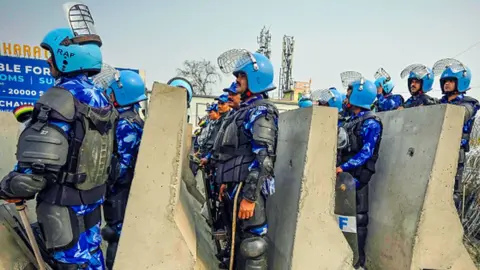Delhi: Farmers face tear gas trying to resume march to India capital
Indian police have used tear gas and water cannon for a second day to stop farmers demanding minimum crop prices from marching on the capital Delhi.
The capital is ringed by razor wire, cement blocks and fencing on three sides to block their entry.
Mostly from Punjab state, the farmers are still 200km (125 miles) from Delhi - thousands of security forces are deployed to block their way.
Farmers say the government broke its word after protests two years ago.
In 2020, farmers blockaded national highways around the capital - their year-long protest was a major challenge and forced the authorities to roll back controversial agriculture reforms, but farmers say other demands have not been met. The government has invited farm leaders to hold talks.
The new protests come months before general elections in which the governing Bharatiya Janata Party (BJP) of PM Narendra Modi is seeking a third consecutive term.
Video footage on Wednesday morning showed thousands of riot police and paramilitary troops deployed along Delhi borders to keep the protesters away.
Farmers allege that plastic and rubber bullets had been used against them, and they criticised the media, saying a perception was being created that farmers were "terrorists" or aligned with opposition parties.
"We have nothing to do with anyone else," farm leader Sarwan Singh Pandher told reporters. "Our demands have been the same from the very beginning."
At the Shambhu border point between Haryana and Punjab states north of Delhi, farmers have been distributing protective eyewear to protesters facing police tear gas shells.
Earlier, Mr Pandher told ANI news agency that there were approximately 10,000 people at the Shambhu border. Calling the attack on the farmers "shameful", he said, "we are farmers and labourers of the country and we do not want any fight".
Mr Pandher appealed to Prime Minister Narendra Modi "to give us a law for MSP".
Minimum support price (MSP) is a guaranteed price that allows farmers to sell most of their produce at government-controlled wholesale markets, or mandis. The farmers are also demanding that the government fulfil its promise of doubling their income, and withdraw court cases filed against farmers during the previous protest.
Farm leaders say at least a dozen farmers have been detained by the police since Tuesday, the day the protest march began after two rounds of talks between farm unions and federal ministers failed to break the deadlock.
On Wednesday, federal minister Anurag Thakur asked farmers to resume talks. "When we have met most of your [farmers'] demands, a solution can be found on the rest through discussions," he told news channel NDTV.
Farm leaders said they were open to continuing talks after hearing about the offer through media. "Our priority is that the talks are held in Chandigarh or anywhere near the protest site," said one of their leaders, Jagjit Singh Dallewal.
More than 200 unions are participating in the march and the farmers aim to reach the capital after crossing the state of Haryana.
On Tuesday, images from the city of Ambala, 200km north of the capital, showed thick clouds of tear gas. At Shambhu, clashes broke out between police and protesters as they tried to press past the barricades. Police dropped tear gas on the crowd using drones.
Several protesters were injured. Security personnel also suffered injuries from stones thrown at them by protesters.
Disruption was reported across Delhi as authorities diverted traffic and blocked roads.
 Getty Images
Getty ImagesThe protesters have received some support from the Punjab and Haryana High Court which has said that as citizens of the country, the farmers had the "right to move freely".
India's opposition leaders have also extended support to them and condemned the government's attempt to stop them from reaching Delhi.
Congress party leaders Rahul Gandhi and Mallikarjun Kharge said on Tuesday that they would enact a law to guarantee minimum price for the farmers if the party was voted to power in the elections.

Read more India stories from the BBC:

